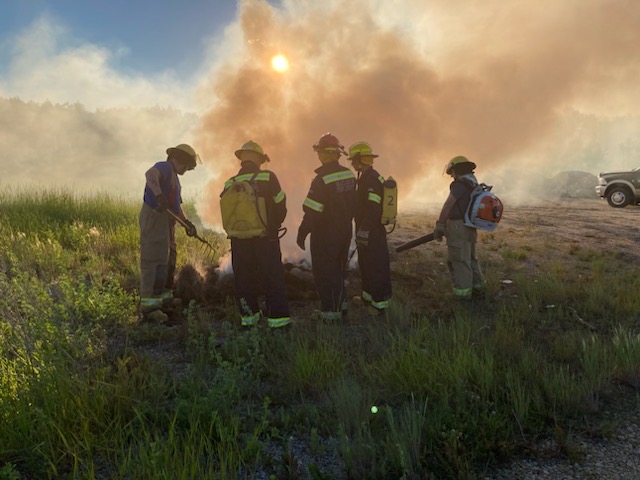
Economic Development, Investment, Trade and Natural Resources Wildfire Service is responsible for the prevention, detection and suppression of wildfires. The program manages all human and equipment resources needed for fighting wildfires in the province. These staff monitor weather patterns, lightning strikes, soil moisture and forest conditions to determine the probability and location of wildfires.
Manitoba's Wildfire Service works in close cooperation with other forest fire fighting agencies and jurisdictions. Equipment and other resources are shared through the Canadian Inter Agency Forest Fire Centre and the Great Lakes Forest Fire Compact.
- Stay indoors as much as possible and avoid exercising outside.
- Drive with the windows up and set the air to recirculate.
- Check air advisories often. Don’t rely solely on what it looks like outside.
- Invest in an air purifier. A good air purifier can reduce particle levels inside your home.
Did you know the RM has an air quality monitor situated on the outside of the Municipal Office building in Clandeboye? You can check the air quality readings throughout the Province in different communities that have this PurpleAir Quality Monitor.
Plan Ahead for Any Emergency With These Essential Items
You can protect members of your household and your property by learning more about wildfires and by taking proper precautions. Make sure that your household has prepared an:
- Emergency Plan
- Emergency Kit or bag with essential items in case you need to leave your home immediately or an evacuation is required
How do Wildfires Start?
Most naturally occurring wildfires in Canada start when lightning strikes a tree or another fuel source. Since these fires often happen in remote locations, they account for roughly 80% of the total area burned by wildfires. Human-caused fires generally happen in more populated areas and are extinguished quicker. Still, it’s important to be cautious and comply with fire bans during high risk periods.
How to Prevent an Out-of-Control Fire or Wildfire
- If you notice an unattended or out-of-control fire, call 911 and the fire department will be dispatched. To Report a Wildfire, call 1-800-782-0076 (toll-free).
- Never leave a fire unattended. Always ensure the fire is completely extinguished by dousing it with water and stirring the ashes until cold (before sleeping or leaving the campsite).
- Always take care when using fuel type lanterns, stoves and heaters. Make sure lighting and heating devices are cool before refueling. Avoid spilling flammable liquids and store fuel away from appliances.
- Do not discard cigarettes, matches, and smoking materials from moving vehicles, or anywhere on park grounds. Be certain to completely extinguish cigarettes before disposing of them.
- Follow local by-laws when burning. Avoid any burning in windy conditions and keep a shovel, water, and fire retardant nearby to keep fires in check. Remove all flammables from the yard when burning.
 Members of Fire Hall #3 in Matlock
Members of Fire Hall #3 in Matlockundergoing a training exercise
Smoke from burning crop residues affects people's health, road safety and the environment. Manitoba's smoke management plan encourages practical and responsible ways of dealing with crop residue. If you must burn, you must adhere to Manitoba's Controlled Crop Residue Burning Program.
Before you burn, call 1-800-265-1233 or check for daily authorizations online at manitoba.ca/agriculture.
The Manitoba Controlled Crop Residue Burning Program is in place from August 1 to November 15 each year. Based on weather conditions, start and end times for burning will be established. In addition to the Manitoba Controlled Crop Residue Burning Program, check and follow all other provincial and municipal burning requirements.
No permits are issued by the R.M. of St. Andrews. Any permits must be obtained from the Province through the following application form: Crop Residue Burning Permit Application Form
If you plan on burning a field or large span of grass or brush, we ask that you notify the local fire chief so that they are aware should a 911 call come in and they can ensure that the appropriate water supply is on hand should it get out of control or they will advise against burning due to the conditions. If a fire does get out of control and spreads out onto adjacent properties, the property owner can be fined under The Wildfires Act as well as the RM's Burning By-Law No. 4425.
ASBESTOS AND NATURAL DISASTERS
Natural Disasters such as wildfires, hurricanes, floods and tornadoes can damage asbestos-containing materials and lead to asbestos exposure among first responders, cleanup crews and nearby residents. Learn how to prevent asbestos exposure when preparing for and cleaning up after a natural disaster.
Check out this guide to learn more about the topics below as well as other safety tips and information on Wildfire Safety.
- How is Asbestos a Risk During a Natural Disaster
- What to Do During Wildfires
- How to Prevent Asbestos Exposure from Other Disasters
Another great source of information is this Homeowners Guide to Asbestos.
FireSmart begins at home. Home and property owners can reduce their risk of wildfire impacts by implementing FireSmart recommendations on building materials and vegetation. Homes, out buildings, trees, shrubs and grasses are all fuel to a wildfire but proper cleaning, thinning and spacing can help reduce the danger of devastating wildfire losses.
Visit www.FireSmartCanada.ca for more information on FireSmart: Protecting Your Community From Wildfire, or the FireSmart Canada Community Recognition Program. Other useful FireSmart prevention resources are listed below.
- FireSmart Begins at Home Guide
Recommendations to reduce the risk and impacts of wildfire to your home and property - Homeowners Assessment Guide
Assessing what changes could make the greatest difference in reducing your wildfire risk - FireSmart Landscape Brochure
Recommendations for safer landscaping and fire resistant vegetation - Wildfire Safety - Fire and Travel Restrictions
Information on fire and travel restrictions implemented by the Province - Wildfire Evacuation Brochure
Tips and safety messages for when wildfire threatens your community